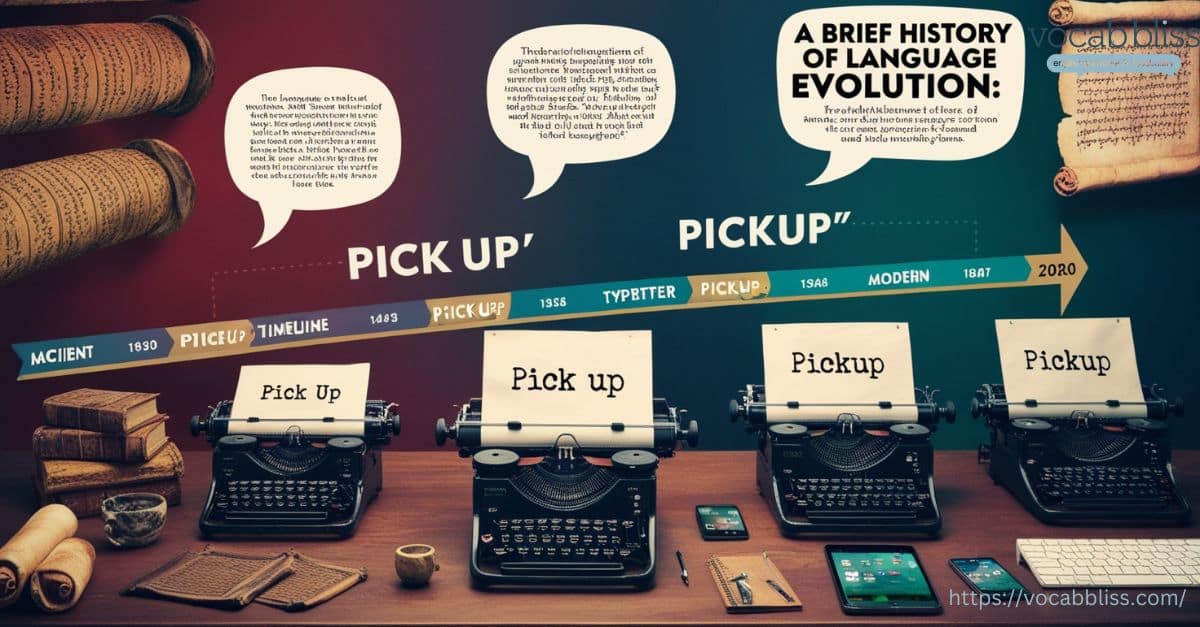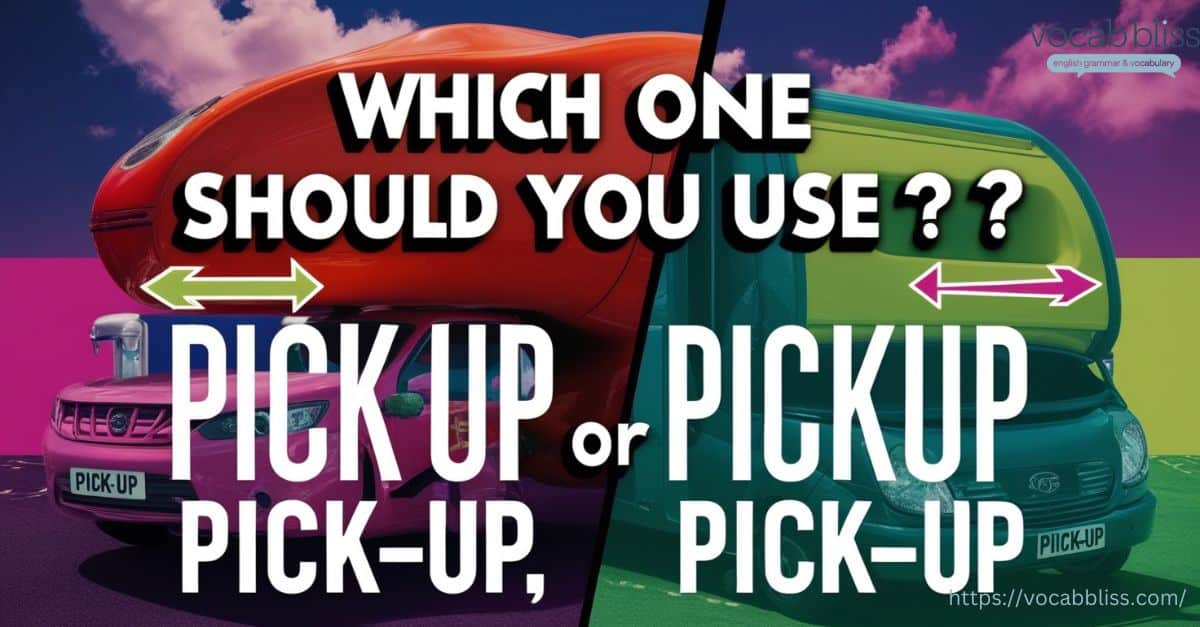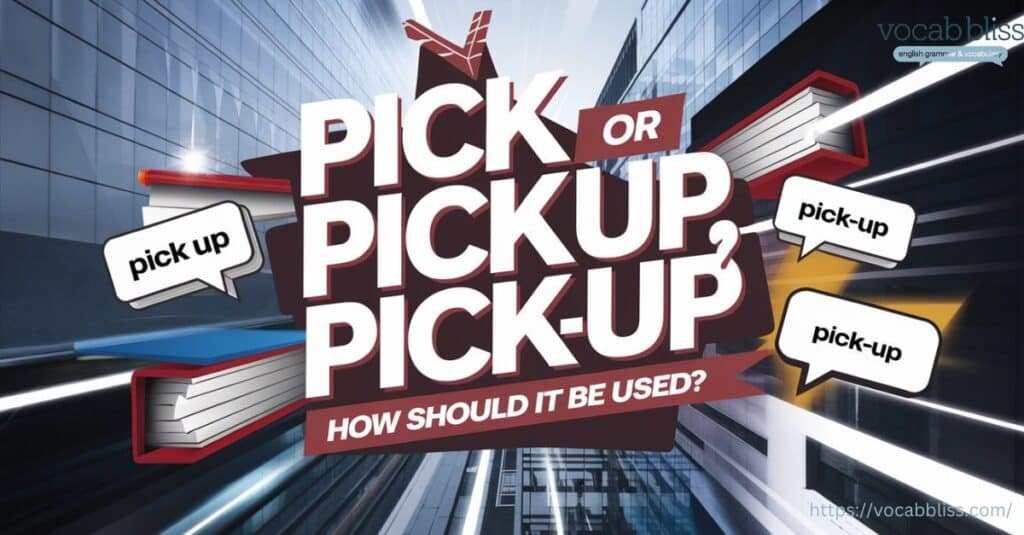Confused about whether to use “pick up or pickup, pick-up”? You’re not alone. These variations often puzzle writers, speakers, and even seasoned editors. In fact, many people find themselves unsure of when to use “pick up, pickup or pick-up.” However, in this article, we’ll demystify the differences, explore their grammatical roots, and show you exactly how to use each form correctly. By the end, you’ll feel more confident in choosing the right form based on the context..
Whether you’re writing a casual email, crafting a novel, or composing technical documentation, this guide will equip you with everything you need to know about “pick up,” “pickup,” and “pick-up.”
Quick Summary
The variations “pick up or pickup, pick-up“ serve different roles in English, each suited to specific contexts. “Pick up” is a phrasal verb used to describe actions, such as lifting, collecting, or acquiring something, both literally and figuratively. “Pickup” functions as a noun or adjective, commonly referring to tangible objects (like a truck), events (like a pickup game), or actions (like a package collection). Meanwhile, the hyphenated “pick-up” is less common, often found in formal or older texts to provide clarity. Recognizing these distinctions ensures you use the right form for the situation, whether writing about a pickup truck, arranging a pick-up, or planning to pick up an item.
Continue reading: Kart vs Cart: Appropriate Use and Context
Why is There Confusion? pick up vs pickup
The confusion surrounding “pick up or pickup, pick-up“ stems from the natural evolution of language and the way written and spoken forms diverge over time. In particular, various factors have contributed to this ambiguity. First, the English language has a history of adopting new forms as words evolve, often blending meanings and simplifying spellings.
Additionally, regional differences and shifting linguistic trends further complicate the situation, leading to inconsistent usage. As a result, it’s crucial to understand these influences and recognize when and where each variation is most appropriate. Here’s a closer look at the factors contributing to this ambiguity:
A Brief History of Language Evolution

Language is always in flux. As societies grow and technology evolves, words adapt to new contexts and uses. For example:
- The compound word “pickup” likely evolved from the phrasal verb “pick up” as its usage expanded to describe objects (like trucks) or concepts (like informal games).
- Over time, hyphenated forms such as “pick-up” often lose their hyphens as words become more common. This process mirrors other transformations, like “e-mail” becoming “email.”
Regional Differences
Geographical areas influence how words are written and spoken:
- American English tends to favor concise, one-word forms like “pickup.”
- British English might lean toward hyphenated forms like “pick-up” for stylistic consistency.
For example, in the U.S., “pickup truck” is the standard term, while in other regions, terms like “utility vehicle” or “ute” may be preferred.
Trends and Context
Trends in writing and speech also play a role. In formal writing, people might separate “pick up” when emphasizing action. Conversely, in casual contexts or industry-specific jargon, “pickup” dominates.
- Example: I’ll pick up groceries (phrasal verb) vs. The package is ready for pickup (noun).
This blend of historical shifts, regional preferences, and contextual nuances explains why these variations coexist. As a result, they often trip people up, leading to confusion in both casual and formal settings.
What Does “Pick Up” Mean?
“Pick up” is a phrasal verb, meaning it combines a base verb (pick) with an adverb (up) to create a unique meaning. This form is highly versatile, used both literally and figuratively in everyday language.
Definition of “Pick Up”
At its core, “pick up” describes an action involving lifting, retrieving, or acquiring something. However, its meaning shifts based on context, ranging from physical actions to abstract improvements or developments.
Common Uses of “Pick Up”
Literal Uses
- Lifting or retrieving objects
- Example: Can you pick up that book from the floor?
- Meaning: Physically lifting or collecting an item.
- Transportation or collection
- Example: I’ll pick up my friend from the airport at 5 PM.
- Meaning: Collecting or retrieving someone or something from a location.
Figurative Uses
- Learning or acquiring a skill
- Example: She picked up French during her trip to Paris.
- Meaning: Gaining knowledge or a skill, often informally.
- Improvement or recovery
- Example: Sales started to pick up after the new campaign launched.
- Meaning: To increase, improve, or recover from a decline.
- Noticing or sensing something
- Example: He quickly picked up on her nervousness during the interview.
- Meaning: Becoming aware of something subtle or implied.
- Speed or intensity
- Example: The wind began to pick up as the storm approached.
- Meaning: To increase in strength or pace.
Examples of How “Pick Up” Functions in Sentences
- Literal:
- I need to pick up the groceries on my way home.
- He stopped to pick up a coin from the sidewalk.
- Figurative:
- You’ll pick up new skills quickly if you practice every day.
- Traffic always picks up around rush hour.
- Mixed:
- Can you pick up the dry cleaning and then pick up some coffee skills for the workshop?
Is Pick Up Hyphenated?

No, “pick up” is not hyphenated when used as a phrasal verb. It is written as two separate words, such as in the sentence, “I will pick up the groceries.” However, when “pickup” is used as a noun or adjective, it is written as a single word, like in “pickup truck” or “pickup game.” The hyphenated form “pick-up” is less common and typically found in specific contexts, such as formal writing or older style guides.
Grammar Note
“Pick up” is always written as two separate words when functioning as a verb, with its tense modified as needed:
- Present: I pick up.
- Past: She picked up.
- Future: They will pick up.
This flexibility makes “pick up” one of the most dynamic tools in the English language, used in countless scenarios, both formal and casual.
What is a “Pickup”?
“Pickup” serves as a noun or adjective and is written as a single word. Unlike the phrasal verb “pick up,” it describes objects, events, or characteristics rather than actions. Its usage spans various contexts, from vehicles to informal activities.
Definition of “Pickup”
As a noun, “pickup” refers to the act of collecting or retrieving something. Additionally, it can describe an item or event associated with collection, or, in some cases, even a specific type of vehicle.
As an adjective, it modifies a noun to describe informal or impromptu activities, such as a “pickup game.”
Examples of Contexts Where “Pickup” is Used
Vehicles
- Refers to a light truck with an open cargo area.
- Common usage: pickup truck.
- Example: The new pickup has excellent towing capacity and off-road features.
Collection or Retrieval
- Refers to the act of collecting items or people.
- Example: The courier scheduled a pickup for the package at noon.
Sports and Recreation
- Refers to informal, unscheduled games or matches.
- Example: We organized a pickup basketball game at the park.
Improvement or Acceleration
- Indicates a boost or increase in activity or intensity.
- Example: There’s been a noticeable pickup in sales this quarter.
Music and Audio
- Refers to a device that captures sound or vibrations, like a guitar pickup.
- Example: He replaced the pickup on his electric guitar for better sound quality.
Informal Meetings or Social Contexts
- Can describe casual interactions or events.
- Example: They had a quick pickup meeting to finalize the project details.
Pickup in Sentences
| Context | Example Sentence |
|---|---|
| Vehicle | I rented a pickup to move my furniture this weekend. |
| Collection | The store offers curbside pickup for online orders. |
| Sports | We joined a pickup soccer match on the beach. |
| Improvement | There’s been a strong pickup in the economy recently. |
| Music | The new guitar pickup delivers a much cleaner sound. |
| Social Context | Let’s have a quick pickup conversation before heading to the meeting room. |
Grammar Note
“Pickup” is written as a single word when functioning as a noun or adjective. Unlike “pick up,” it does not separate into two words, and it doesn’t change form for tense.
What is a “Pick-Up”?
The hyphenated form “pick-up” is the least commonly used variation, but it still holds significance in certain contexts. It combines the qualities of “pick up” (the verb) and “pickup” (the noun/adjective) but introduces a hyphen for clarity or stylistic preference.
Definition and Usage of “Pick-Up”
As a noun or adjective, “pick-up” functions similarly to “pickup.” The hyphen is often used to:
- Clarify meaning, especially in formal or older texts.
- Separate syllables to ensure readability.
For example:
- There’s a scheduled pick-up for the package.
- He bought a pick-up truck for his landscaping business.
Why It’s Less Common
Over time, English tends to drop hyphens from compound words as their usage becomes more frequent and widely understood. As a result, forms like “pickup” have become the preferred choice in everyday language. Additionally, this shift reflects a broader trend toward simplification in spelling. Consequently, the hyphenated “pick-up” is now seen less often, especially in modern, informal contexts. This has made the hyphenated “pick-up” less common than its counterparts.
Factors Contributing to Its Decline:
- Simplification of Spelling
- Modern English leans toward simpler forms like “pickup.”
- Example: The courier scheduled a pickup for the package.
- Regional Preferences
- American English, in particular, favors single-word constructions, phasing out hyphenated forms.
- Increased Informality in Writing
- Casual, digital communication encourages streamlined spelling and reduces the need for hyphenated words.
Specific Contexts for “Pick-Up”
While less common, “pick-up” is still found in:
- Older or Formal Writing
- Example: The report highlighted a significant pick-up in industrial output.
- Specific Style Guides
- Some style guides or industries might prefer the hyphen for consistency or clarity.
- Niche Uses
- Rarely, “pick-up” may be employed to avoid confusion in ambiguous contexts, such as distinguishing between a phrasal verb and a noun.
Examples in Sentences
| Context | Sentence |
|---|---|
| Noun | Please confirm the pick-up time for the delivery. |
| Adjective | He brought a pick-up line to the comedy show that had everyone laughing. |
| Ambiguity Avoidance | The pick-up in demand was faster than expected. |
Summary
Although “pick-up” is becoming less common, it remains relevant in specific contexts where clarity or tradition demands its use. However, for most modern purposes, “pickup” or “pick up” are the preferred forms, reflecting a broader trend toward simplification in English writing.
Proper Use and Definitions
Verb Form: Pick Up
When using “pick up” as a verb, it’s always split into two words.
| Tense | Example |
|---|---|
| Present | I pick up the mail every morning. |
| Past | She picked up a new skill last year. |
| Future | They’ll pick up their orders later. |
Noun/Adjective Form: Pickup
When describing objects or events, use “pickup.”
| Context | Example |
|---|---|
| Vehicle | The pickup has excellent off-road capabilities. |
| Retrieval/Collection | Please schedule a pickup for your package. |
| Informal Games | They enjoy organizing pickup games of soccer. |
Pick-Up as Past and Future Tense Use
For tense consistency, always split “pick up” when referring to actions.
- Past: He picked up the kids after school.
- Future: She’ll pick up the pace during her run tomorrow.
Which One Should You Use?

To decide between “pick up,” “pickup,” and “pick-up,” consider these rules:
- Use “pick up” for actions or activities.
- Use “pickup” for nouns or adjectives.
- Use “pick-up” when hyphenation is required for style or clarity.
Quick Reference Table
| Form | Role | Example |
|---|---|---|
| Pick Up | Verb (phrasal) | Let’s pick up some coffee. |
| Pickup | Noun/Adjective | The pickup truck needs repairs. |
| Pick-Up | Hyphenated form | He arranged a pick-up at the site. |
Origins of “Pick Up or Pickup, Pick-Up”
Origins of “Pickup vs Pick Up”
“Pickup” originated in the early 20th century, often tied to vehicles or sports. The hyphenated “pick-up” appeared as a transitional form during this time.
Origins of “Pick Up”
The phrase “pick up” dates back to Middle English, combining “pick” (to choose or lift) and “up” (directional emphasis).
Examples in Context
Sentence Examples
- I’ll pick up dinner on the way home.
- The courier scheduled a pickup for noon.
- A pick-up service is available for larger orders.
Synonyms and Similar Terms to “Pick Up or Pickup, Pick-Up”

“Pickup or Pick-Up”
- Retrieval
- Collection
- Acquisition
Synonyms for “Pick Up”
- Gather
- Acquire
- Retrieve
Examples of How to Use Pickup in a Sentence
- The pickup truck handled the rough terrain effortlessly.
- After work, we played a quick pickup game at the park.
FAQs

Is Pickup One Word?
Yes, “pickup” is one word when used as a noun or adjective. For example, in sentences like “I drove my pickup truck to work,” or “The pickup time for the package is 3 PM.”
Is Pick Up One Word?
No, “pick up” is not one word. It is written as two separate words when used as a phrasal verb. For example, “I will pick up the groceries on my way home.”
Is Pickup One Word or two?
Yes, “pickup” is one word when used as a noun or adjective, like “pickup truck” or “pickup game.” It refers to things or events related to collection or gathering.
Conclusion
In this article, we’ve explored the differences between “pick up,” “pickup,” and “pick-up” to help you understand their correct usage.
- “Pick up” is a phrasal verb used to describe actions, such as lifting or collecting something, whether literally or figuratively.
- “Pickup” is a noun or adjective, often referring to objects (like a truck) or events (like an informal game).
- “Pick-up” is the hyphenated form, typically found in formal or older texts but less common in modern usage.
When writing or speaking, it’s important to choose the correct form based on the context. Whether you’re discussing the action of “picking up” an item, referring to a “pickup truck,” or scheduling a “pick-up” for a delivery, understanding these distinctions will help you communicate more clearly and confidently.
Explore further:
- ballon or balloon: Solving the Spelling Issue
- High Quality or High-Quality: Which One Should You Use?
- Is It Fourty or Forty? Which One Is Accurate?
- Inbetween or In Between? Which Is Correct?

Jorge Phillips is an experienced blogger who writes for Vocab Bliss, sharing his passion for the English language. With a knack for simplifying complex grammar rules and a focus on commonly confused words, Jorge helps readers navigate the nuances of English with ease. His insights aim to make learning engaging and practical.







